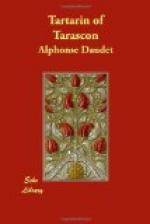In vain did Quixote-Tartarin vow that he had not committed any imprudence — that he would wrap himself up well, and take even superfluous necessaries with him. Sancho-Tartarin would listen to nothing. The poor craven saw himself already torn to tatters by the lions, or engulfed in the desert sands like his late royal highness Cambyses, and the other Tartarin only managed to appease him a little by explaining that the start was not immediate, as nothing pressed.
It is clear enough, indeed, that none embark on such an enterprise without some preparations. A man is bound to know whither he goes, hang it all! and not fly off like a bird. Before anything else, the Tarasconian wanted to peruse the accounts of great African tourists, the narrations of Mungo Park, Du Chaillu, Dr. Livingstone, Stanley, and so on.
In them, he learnt that these daring explorers, before donning their sandals for distant excursions, hardened themselves well beforehand to support hunger and thirst, forced marches, and all kinds of privation. Tartarin meant to act like they did, and from that day forward he lived upon water broth alone. The water broth of Tarascon is a few slices of bread drowned in hot water, with a clove of garlic, a pinch of thyme, and a sprig of laurel. Strict diet, at which you may believe poor Sancho made a wry face.
To the regimen of water broth Tartarin of Tarascon joined other wise practices. To break himself into the habit of long marches, he constrained himself to go round the town seven or eight times consecutively every morning, either at the fast walk or run, his elbows well set against his body, and a couple of white pebbles in the mouth, according to the antique usage.
To get inured to fog, dew, and night coolness, he would go down into his garden every dusk, and stop out there till ten or eleven, alone with his gun, on the lookout, behind the baobab.
Finally, so long as Mitaine’s wild beast show tarried in Tarascon, the cap-poppers who were belated at Costecalde’s might spy in the shadow of the booth, as they crossed the Castle-green, a mysterious figure stalking up and down. It was Tartarin of Tarascon, habituating himself to hear without emotion the roarings of the lion in the sombre night.
Pending Tartarin’s delay of the event by all sorts of heroic means, all Tarascon kept an eye upon him, and nothing else was busied about. Cap-popping was winged, and ballad-singing dead. The piano in Bezuquet’s shop mouldered away under a green fungus, and the Spanish flies dried upon it, belly up. Tartarin’s expedition had a put a stopper on everything.
Ah, you ought to have seen his success in the parlours. He was snatched away by one from another, fought for, loaned and borrowed, ay, stolen. There was no greater honour for the ladies than to go to Mitaine’s Menagerie on Tartarin’s arms, and have it explained before the lion’s den how such large game are hunted, where they should be aimed at, at how many paces off; if the accidents were numerous, and the like of that.




